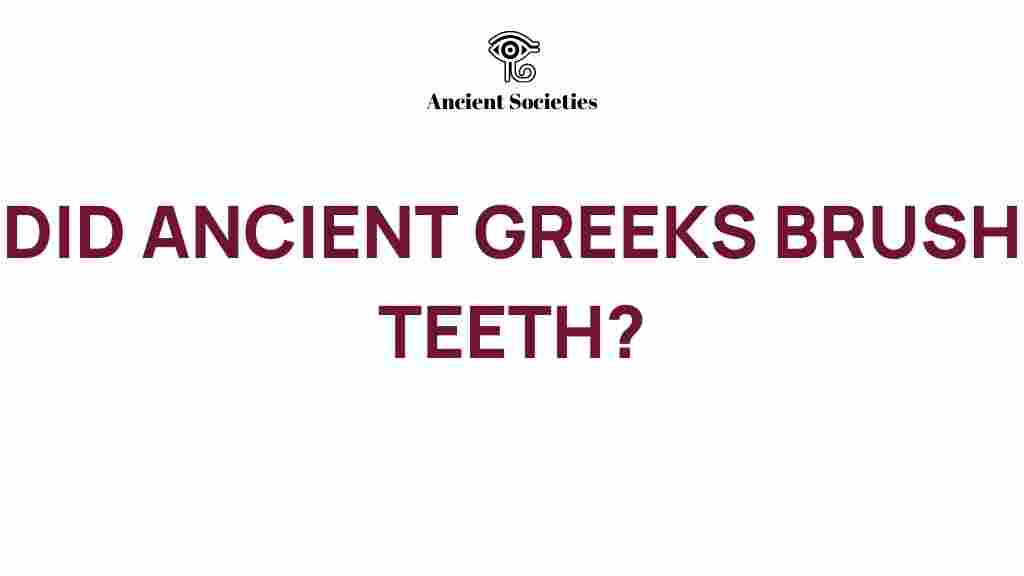Did Ancient Greeks Really Brush Their Teeth? Uncovering Dental Secrets
The history of dental hygiene is as fascinating as it is important. As we delve into the practices of ancient civilizations, one question often arises: did the Ancient Greeks practice any form of dental hygiene? This article will explore the health practices surrounding oral care in Ancient Greece, revealing the methods they used for teeth cleaning, their cultural habits, and the archaeological evidence that supports these practices.
The Importance of Dental Hygiene in Ancient Civilizations
Dental hygiene has been a concern for humanity for centuries. The state of one’s teeth can significantly affect overall health. In ancient civilizations, including the Ancient Greeks, there was an awareness of the need for oral care. Often, this awareness was linked to broader health practices.
- Health and Social Status: Well-maintained teeth were often a sign of higher social standing.
- Dietary Influence: The diet of the Ancient Greeks, which included grains and dairy, contributed to oral health issues, highlighting the need for effective dental hygiene.
- Mental Well-being: Good dental hygiene was also associated with confidence and social interaction.
Dental Hygiene Practices of the Ancient Greeks
Ancient Greeks did not have modern toothbrushes or toothpaste, but they employed several techniques to maintain their dental health. Archaeological findings suggest various methods used for dental hygiene:
1. Chewing Sticks
One of the primary methods of teeth cleaning involved the use of chewing sticks. These were small twigs or roots whose ends were frayed to create a brush-like effect. The Greeks likely used:
- Branches from aromatic trees, which helped freshen breath.
- Natural antiseptic properties of certain plants to combat bacteria.
2. Powders and Pastes
While the Greeks did not have commercial toothpaste, they made their own dental powders and pastes using:
- Crushed bones: Used for their abrasive properties.
- Charcoal: Known for its ability to whiten teeth.
- Herbs: Such as mint and sage, to freshen breath.
3. Rinsing Solutions
Rinsing the mouth was another common practice. The Greeks often used:
- Saltwater: To cleanse the mouth and promote healing.
- Vinegar: Known for its antibacterial properties.
Cultural Habits Surrounding Oral Care
The approach to oral care in Ancient Greece was not just about physical hygiene but also intertwined with their cultural beliefs and social practices:
- Philosophical Beliefs: Many philosophers emphasized the importance of a healthy body, which included taking care of one’s teeth.
- Rituals and Myths: Oral hygiene sometimes featured in rituals and myths, highlighting its significance in society.
Archaeological Evidence of Dental Hygiene
Archaeology provides invaluable insights into the history of dental hygiene practices. Excavations in ancient Greek sites have uncovered:
- Dental Tools: Items that resemble ancient toothbrushes and dental picks.
- Health Records: Writings that reference dental care and its importance.
- Fossils: Evidence of dental conditions that suggest a need for oral care.
Step-by-Step Process of Ancient Greek Dental Hygiene
If one were to emulate the ancient Greek approach to dental hygiene, it might look something like this:
- Choose a Chewing Stick: Select a twig from a suitable tree, ensuring it’s fresh and aromatic.
- Prepare a Dental Powder: Mix crushed bones, charcoal, and herbs to create a cleaning paste.
- Brush Your Teeth: Use the frayed end of the stick to gently scrub your teeth and gums.
- Rinse: Swish a mixture of saltwater or vinegar to cleanse your mouth.
- Repeat Regularly: Incorporate this routine into your daily habits for optimal oral health.
Troubleshooting Common Issues
If you choose to adopt these ancient practices, you may encounter some challenges. Here are some troubleshooting tips:
- Finding the Right Chewing Stick: Look for flexible branches that are easy to fray.
- Creating a Balanced Powder: Experiment with different herbs to find a blend that suits your taste.
- Overuse of Abrasives: Be gentle to avoid damaging the enamel; moderation is key.
Conclusion
In conclusion, the Ancient Greeks had a rich understanding of dental hygiene that laid the groundwork for modern practices. Their methods of teeth cleaning through chewing sticks, herbal powders, and rinsing solutions show that oral care was an integral part of their health practices. As we uncover these cultural habits through archaeology, we gain valuable insights into their lives and the importance they placed on maintaining health.
For more information on the evolution of dental care through history, check out this article on dental practices in ancient civilizations. Understanding our past can help us appreciate the advancements we have today, and perhaps inspire us to adopt some of these time-tested traditions.
As we reflect on the history of oral care, it becomes clear that the quest for a healthy smile has been a universal goal, transcending time and culture.
This article is in the category Archaeology and created by AncientSocieties Team
